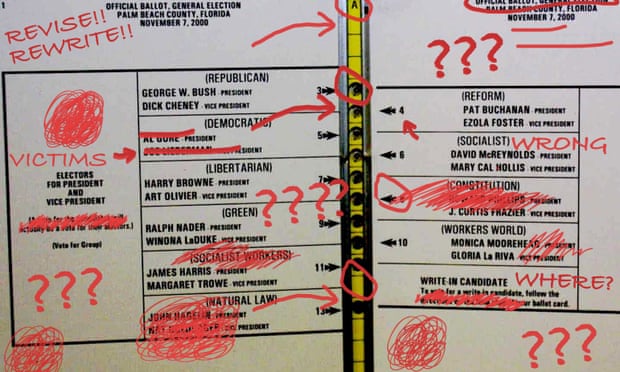The 2000 election revisited

You can’t (yet) find a better example of the randomness, arbitrariness, and contingency-riddled nature of American presidential elections than what happened in 2000.
Consider everything that had to happen for George W. Bush to end up being declared the winner. This is a very incomplete list of course:
(1) Ralph Nader had to do his level best to take away as many net votes from Gore as possible. Thanks Ralph! I have to say that’s another Loomis obit that I’m waiting for with genuine anticipation.
(2) Al Gore had to choose Joe Lieberman rather than Bob Graham as his VP candidate. Hindsight is 20/20 but . . .
(3) The Supreme Court had to stop the state-wide recount in Florida, on the basis of a very special one-time only interpretation of the 14th amendment, never used before or since by any conservative justice in any other context. (It was pretty considerate on the part of the 5-4 majority to specify that the case didn’t count as a precedent, which I believe is literally the only time in the history of the SCOTUS that a majority has declared such a thing.)
(4) Somebody in the Palm Beach County election apparatus had to design a totally dysfunctional ballot:
After the election, many voters from Palm Beach claimed they had inadvertently voted for Mr. Buchanan when they meant to vote for Mr. Gore. This is clear in the data. Mr. Buchanan fared far better in Palm Beach County than he did on the other side of the county line. Indeed, Mr. Buchanan fared far better in Palm Beach County than any politically or demographically comparable area in the country.
You can see this pattern quite clearly in this map, courtesy of Matthew C. Isbell, a Democratic data strategist and consultant:

Mr. Buchanan also fared much better among Election Day voters — who used the butterfly ballot — than among absentee voters, who did not, a pattern not seen elsewhere in the state. Mr. Buchanan’s support was also concentrated in Democratic areas, even though he was a very conservative candidate.
As far as the data goes, the case is a slam dunk: At least 2,000 voters who meant to vote for Gore-Lieberman ended up voting for Mr. Buchanan. All else being equal, that would have been enough to decide the election.
The 2000 election also marked a sea change in the conventional wisdom regarding the significance of a candidate winning the presidency while losing the actual vote. When I was a sweet young thing it was understood by all right-thinking people that such an outcome would be something of a calamity from the standpoint of electoral legitimacy, and we were very lucky that nothing like that had happened since the middle of the 19th century, when only about 23% of the population was allowed to vote anyway, so we only had a “democracy” in the very loosest sense.
But once it became necessary to legitimate Ws win, that suddenly went out the window, to the point that, when Trump lost by more than two million votes in 2016, raising this was met by the now-standard “it’s a Republic not a Democracy” nonsense. Then Biden won by seven million votes in 2020, and it almost happened again! If Biden wins by ten million votes this November but loses the Electoral College — both distinct possibilities — will people continue to simply swallow this absurd structure? Stay tuned to find out!


